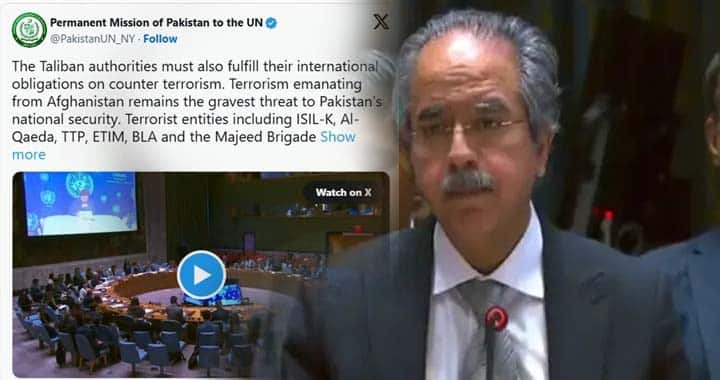Pakistan’s Permanent Representative to the United Nations, Ambassador Asim Iftikhar Ahmad, has warned that more than 60 terrorist camps linked to outlawed groups, including Tehreek-e-Taliban Pakistan (TTP), remain active in Afghanistan, posing the most serious threat to Pakistan’s national security.
Briefing the UN Security Council on the situation in Afghanistan, Ambassador Asim Iftikhar stressed that the Taliban authorities must fulfill their international counterterrorism obligations to dismantle these networks.
He underscored that several terrorist outfits including Daesh-Khorasan, Al-Qaeda, the banned TTP, Eastern Turkistan Islamic Movement (ETIM), Balochistan Liberation Army (BLA), and Majid Brigade — continue to operate from Afghan sanctuaries. These groups, he said, maintain more than 60 camps being used as bases for cross-border infiltration and attacks.
“We have credible evidence of collaboration among these terrorist organizations,” the Ambassador said, pointing to joint training, illegal arms trafficking, sheltering of militants, and coordinated assaults aimed at targeting Pakistani civilians, law enforcement agencies, critical infrastructure, and development projects.
The envoy reiterated that terrorists based in Afghan sanctuaries were directly involved in attacks inside Pakistan. He recalled that Pakistan, in partnership with China, had submitted a request for global sanctions on the BLA and Majid Brigade, emphasizing that the Taliban must honor their international responsibilities by eliminating these safe havens.
Ambassador Asim Iftikhar further urged the international community to play its role in fostering peace and stability in Afghanistan, noting that regional security was inextricably linked to decisive action against terrorist networks.
His remarks came after repeated warnings by Pakistan that Afghan soil was being used for cross-border terrorism. Prime Minister Shehbaz Sharif had earlier cautioned that Afghanistan must “choose between hosting Khawarij or maintaining ties with Pakistan,” stressing that Afghan nationals were involved in recent attacks carried out from across the border.





